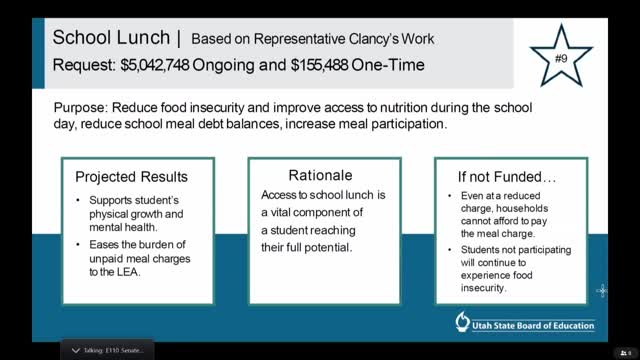Committee Weighs $5M School‑Lunch Request as Members Raise Food‑Waste and Targeting Concerns
January 28, 2025 | 2025 Utah Legislature, Utah Legislature, Utah Legislative Branch, Utah
This article was created by AI summarizing key points discussed. AI makes mistakes, so for full details and context, please refer to the video of the full meeting. Please report any errors so we can fix them. Report an error »

The Education Subcommittee discussed a request to expand state support for school lunch programs and reduce meal debt.
Presenter Member Cindy Davis described a request of “5,000,000 ongoing and a 55001 time” (the transcript rendered the one‑time figure ambiguously). She said the request is intended to reduce food insecurity and to address meal debt that accumulates when families cannot pay the reduced-price portion of school meals. “We have…parents saying, 'Can you please help?'” Davis said, adding that some local board members privately subsidize student lunches when districts cannot.
Representative McPherson raised food‑waste research, referencing a USDA 2019 study he said found “upwards of about 40% of school lunches were wasted.” He suggested that if a large share of additional funding were being thrown away, that would argue for careful targeting or complementary operational changes. Davis and other presenters agreed that food waste occurs, but cautioned the committee that available information does not identify which students discard food. “We cannot assume that that food waste is by students on reduced or free lunch,” Davis said.
Senator Johnson suggested a targeted grant program to allow schools to evaluate need on a case‑by‑case basis rather than a blanket ongoing appropriation. Representative Locks (as transcribed) and others pressed for operational changes that could reduce waste, including ensuring students have sufficient seat time to eat. One legislator cited the American Academy of Pediatrics guidance that students need about 20 minutes seated to consume a meal; a speaker said many students have less time because of line delays and scheduling.
Representative Moss described visiting schools and finding meals “appealing,” and encouraged investigation into causes of waste beyond food quality—stigma attached to receiving free or reduced lunch was mentioned by several members as a possible factor.
No appropriation vote was taken at the meeting. Committee members raised follow‑up questions about whether the request should be ongoing or more narrowly targeted, and whether operational changes (for example, scheduling to allow 20 minutes of seated eating time) should accompany any funding increase.
Presenter Member Cindy Davis described a request of “5,000,000 ongoing and a 55001 time” (the transcript rendered the one‑time figure ambiguously). She said the request is intended to reduce food insecurity and to address meal debt that accumulates when families cannot pay the reduced-price portion of school meals. “We have…parents saying, 'Can you please help?'” Davis said, adding that some local board members privately subsidize student lunches when districts cannot.
Representative McPherson raised food‑waste research, referencing a USDA 2019 study he said found “upwards of about 40% of school lunches were wasted.” He suggested that if a large share of additional funding were being thrown away, that would argue for careful targeting or complementary operational changes. Davis and other presenters agreed that food waste occurs, but cautioned the committee that available information does not identify which students discard food. “We cannot assume that that food waste is by students on reduced or free lunch,” Davis said.
Senator Johnson suggested a targeted grant program to allow schools to evaluate need on a case‑by‑case basis rather than a blanket ongoing appropriation. Representative Locks (as transcribed) and others pressed for operational changes that could reduce waste, including ensuring students have sufficient seat time to eat. One legislator cited the American Academy of Pediatrics guidance that students need about 20 minutes seated to consume a meal; a speaker said many students have less time because of line delays and scheduling.
Representative Moss described visiting schools and finding meals “appealing,” and encouraged investigation into causes of waste beyond food quality—stigma attached to receiving free or reduced lunch was mentioned by several members as a possible factor.
No appropriation vote was taken at the meeting. Committee members raised follow‑up questions about whether the request should be ongoing or more narrowly targeted, and whether operational changes (for example, scheduling to allow 20 minutes of seated eating time) should accompany any funding increase.
View full meeting
This article is based on a recent meeting—watch the full video and explore the complete transcript for deeper insights into the discussion.
View full meeting

